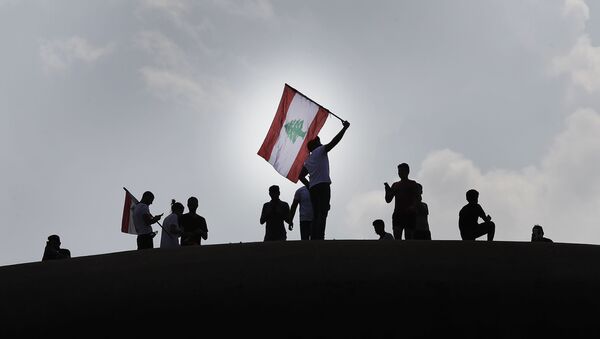In Lebanon, just like in many other countries in the region, the race for the White House has stirred interest, curiosity, and mainly concern, and Makram Rabah, a lecturer at the department of history at the American University of Beirut, says the US elections have also split the Lebanese public.
"Those, who oppose Hezbollah [a Shiite militia linked to Iran and currently a part of the Lebanese government - ed.] and the Iranian axis wanted [Donald] Trump to win. At the same time, the majority of the Lebanese [people] perceived him as a weird, aggressive, and uncouth president, so his defeat didn't upset many".
It certainly didn't upset the chief of Hezbollah Hassan Nasrallah, who rejoiced at Trump's "humiliating defeat", adding it came as punishment for his "blatant crime against Martyr Qasem Soleimani and Abu Mahdi Al Mohandas", top Iranian and Iraqi commanders, who were assassinated by a targeted US strike in January.
For him, Trump's departure also means a potential lifting of American sanctions, which have been suffocating an already ailing Lebanese economy.
Sanctions Won't Be Lifted
But Rabah says that even if Biden does end up taking office, he is unlikely to change Washington's policy towards Hezbollah, primarily because there is a consensus in the US that a group responsible for the killing of more than 240 American servicemen in Beirut in 1983 should be held accountable for its actions.
"Sanctions against Hezbollah is not a 'Trump thing'. They will need to go through Congress and I doubt Biden will relinquish those sanctions, [primarily because] that pressure campaign was successful".
In 2018, shortly after he left the Joint Comprehensive Plan of Action, a deal that lifted western sanctions against Iran in exchange for the ability to supervise its nuclear programme, Trump unloaded a number of sanctions on the Islamic Republic and its ally Hezbollah, whose budget has been extremely reliant upon cash injections from Tehran.
Reports suggested that those sanctions dealt a severe blow to the Shiite militia, which saw its 2019 budget of nearly a billion dollars being significantly trimmed down.
Past Mistakes Won't Be Repeated
But the effectiveness of US sanctions is far from being the only reason that might keep them intact, and Rabah believes Washington is likely to maintain a tight grip over the Shiite group simply because it would not want to repeat the mistakes of the past and would not want to go back to the Barack Obama years, "when Hezbollah was given a cover".
The "cover" in question is the alleged decision by the Obama administration to turn a blind eye to the problematic conduct of Hezbollah which reportedly evolved into a criminal organisation under his nose, becoming an organisation that not only boosted its weapons arsenal but one that also channelled drugs into the US and engaged in other illegal activities.
"Hezbollah is branded as a terror organisation by the US [decision in place since 1995 - ed.] so the sanctions are not only unlikely to go away, they might even increase under Biden. He will not take on the group 'hands on' but he will continue the pressure and that could be more lethal for the organisation than [any] military action [against it]", Rabah believes.
Cash Flow Not an Option?
Still, Hezbollah might be relieved of that pressure if Biden sticks to his promise to re-enter talks with Iran, dropped by Trump two years ago.
Resumed talks with the Islamic Republic that could pave the way to the lifting of sanctions might open a tap of cash into Hezbollah, but Rabah says he doubts they will ease the group's economic woes.
"Any sort of compromise [that Iran and the US might reach - ed.] will not empower Hezbollah. Quite the opposite is true. It might empower the Lebanese state, if the issue is properly addressed", Rabah continues.
Lebanon certainly needs that "empowerment". The International Monetary Fund has warned that the country is expected to see a 25 percent decline in its economy by the end of the year. Unemployment rates have also shown an alarming tendency, surpassing 30 percent at the end of June.
To overcome the acute financial crisis, Lebanon entered talks with the IMF in May, asking the international body to provide the nation with billions of dollars in assistance. But two months down the line those negotiations were halted due to the country's inability to introduce the necessary reforms.
The lack of reforms was also behind the decision to halt the generous flow of cash donations collected to help Lebanon overcome the Beirut explosion that shook the city in early August.
Although much of that help has been transferred unconditionally to tackle the country's urgent needs, Paris, who played a pivotal role in raising those funds, warned that any further assistance would be frozen if Beirut didn't recalculate its route.
The problem, says Rabah, is that his country is unlikely to see these reforms implemented.
"Under the current circumstances, I don't see how these money injections will be reaching Lebanon. To start off, Hezbollah is in absolute control of the government. Secondly, structural reforms have not been implemented yet, and, lastly, the Gulf states [that usually donate the money] will prefer to hold it close to their chest as long as the Shiite group is in charge and as long as it continues its verbal attacks on those countries".



